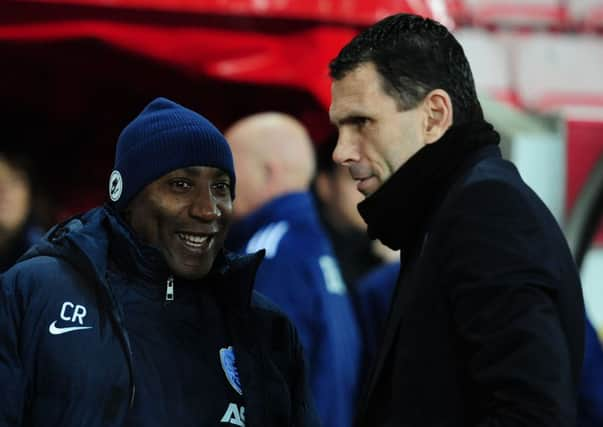It’s about wins and not words says Sunderland boss Gus Poyet


But it doesn’t do them any good. Just ask sacked Aston Villa boss Paul Lambert, or the equally dour Nigel Pearson, teetering on the brink of the trapdoor at Leicester City.
Winning games keeps supporters onside. Full stop.
However heavily Jose Mourinho (or previously Sir Alex Ferguson) attempts to manipulate the media, he is the grandmaster at winning football matches. Whatever he says, or doesn’t say, is only of secondary importance.
Advertisement
Hide AdAdvertisement
Hide AdIt was a point well-made by Gus Poyet, as he attempted to clarify post-match comments which again earned the ire of Sunderland fans, following Tuesday’s defeat to QPR.
Poyet isn’t going to tone down his approach. He speaks his mind, even if he believes his references to supporters were completely misinterpreted in midweek.
But the Sunderland boss knows that whether he says all the right things, or all the wrong things, he needs to win the games to keep the Black Cats free from the threat of relegation.
“It’s very easy to say everything is fine, we’re all beautiful people and it’s very nice,” said Poyet today.
Advertisement
Hide AdAdvertisement
Hide Ad“That sounds great, but it doesn’t mean we’ll win next Saturday.
“I’ve seen many, many managers saying the right words all the time and not winning, and they’re out anyway.
“The fans put up banners against them (Lambert). It didn’t help.
“The only way to convince fans is winning football games.
“After you win football games, the next step is having a way so that people recognise your club.
“You can call it an identity or a way of playing.
“Then not only do you win, but you win in a special way.
Advertisement
Hide AdAdvertisement
Hide Ad“At the moment, we need to win. The second part we can leave for the future.”
The implication from Poyet in several addresses over the last month or so, has been that supporters at the Stadium of Light are not sufficiently patient when Sunderland are trying to develop a possession-based approach.
However, Poyet is adamant that is not the case.
He stresses that it is the players who have to adapt to playing at home, rather than fans giving the team more leeway.
And he says that if he was in the stands for Tuesday’s game, he would have been giving Sunderland stick during a dreadful opening half-hour.
Advertisement
Hide AdAdvertisement
Hide AdPoyet said: “If you really read what I say, it’s the way WE need to play to win football games at home.
“I said that at home, the fans want to see the team playing one way and we need to adapt to that way of playing because if not, it’s more difficult.
“Now, to pass the ball three yards and not give it to a red and white shirt, that’s nothing to do with me, the fans, the press or social media.
“That’s the quality on the pitch of giving it to a team-mate. That’s the bottom line.
Advertisement
Hide AdAdvertisement
Hide Ad“Now, if I’m in the stand and I’ve bought a ticket, and I see my player not able to pass the ball three yards, I’m going to get upset.
“That’s what happened on Tuesday. Nothing else.”
“In the second half, I didn’t hear any boos. We played in a certain way, tried everything, couldn’t score and still ended up losing.
“It was never meant to be towards the fans.
“Right now, that football I was trying to achieve, the calmness, the quality on the pass has been far from good.
“We did something totally different against Burnley and we played very well and everybody was happy.
Advertisement
Hide AdAdvertisement
Hide Ad“We were trying to do the same against QPR, but we didn’t do it.”
Poyet adds that there shouldn’t be a lengthy post-mortem into any of his comments.
“Someone at home can think I’m talking the truth, and another can think I’m taking the mick,” he said.
“It depends on how you put it in context. But don’t search for anything because the day I want to criticise someone I will say it.
“I’m not the type of manager who criticises players, but the day I do, I will say their name and criticise.
“I don’t want to play a game where people at home have to guess what I mean.”